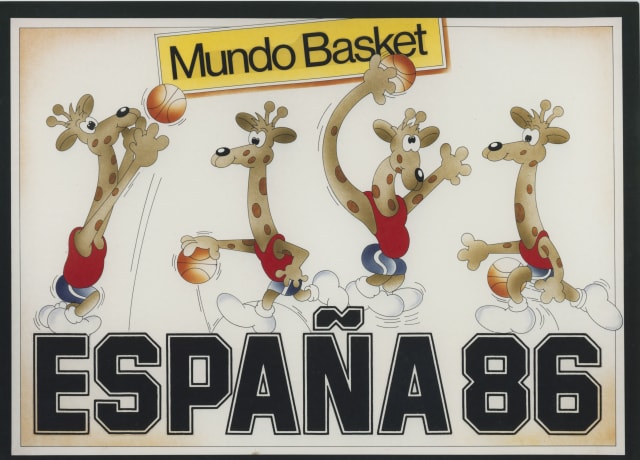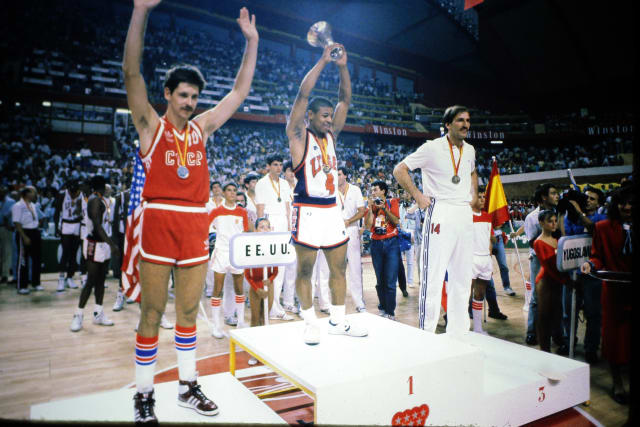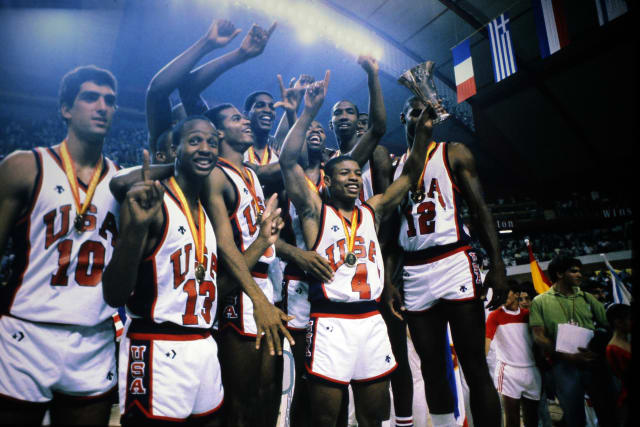The Best of 1986 World Cup: USA topple Soviet Union, Petrovic MVP amongst many legends
The FIBA Basketball World Cup 1986 was hosted in western Europe for the first time with Spain welcoming an expanded field of 24 teams. USA beat Soviet Union for the title, and Yugoslavia finished third.
MIES (Switzerland) - The FIBA Basketball World Cup in 1986 was hosted for the first time in western Europe with an expanded field of 24 teams converging on Spain. In the end, the United States of America ended a 32-year wait for their first title since 1954. The Soviet Union finished second and Yugoslavia were third.
The Final was a rematch of the 1982 title game bout with USA beating Soviet Union for their second World Cup trophy. Yugoslavia defeated Brazil for third place. USA, Soviet Union, and Yugoslavia shared the podium for the second straight World Cup and third in the last four editions.
This was the first edition of the World Cup played with the three-point line. Oscar Schmidt from Brazil was the player who scored the most three-pointers, marking the beginning of a new era.
The best team: USA
| Rank | Team | W-L |
| 1. | USA | 9-1 |
| 2. | Soviet Union | 9-1 |
| 3. | Yugoslavia | 8-2 |
| 4. | Brazil | 6-4 |
| 5. | Spain | 8-2 |
| 6. | Italy | 7-3 |
| 7. | Israel | 5-5 |
| 8. | Canada | 5-5 |
| 9. | China | 4-6 |
| 10. | Greece | 4-6 |
| 11. | Cuba | 4-6 |
| 12. | Argentina | 5-5 |
| 13. | Angola | 1-4 |
| - | Australia | 2-3 |
| - | Cote d'Ivoire | 0-5 |
| - | France | 3-2 |
| - | Germany | 2-3 |
| - | Korea | 0-5 |
| - | Malaysia | 0-5 |
| - | Netherlands | 2-3 |
| - | New Zealand | 1-4 |
| - | Panama | 1-4 |
| - | Puerto Rico | 2-3 |
| - | Uruguay | 2-3 |
The 1986 World Cup brought the global game back to Europe - with the largest tournament to date in terms of teams hosted by Spain. The games were played in Zaragoza, Ferrol, Malaga, Tenerife, Barcelona, Oviedo and Madrid from July 5 to 20.
After14 teams being the biggest previous field for a World Cup, the 1986 edition expanded to 24 nations. The participants were hosts Spain; holders Soviet Union; five teams from a European Qualifying Tournament - Italy, Germany, Netherlands, Greece and Israel; top three qualified teams from South American Championship - Brazil, Uruguay and Argentina; top three qualified teams from CentroBasket - Puerto Rico, Panama and Cuba; top three qualified teams from Asia - Korea, China and Malaysia (the latter ranked 4th in the FIBA AsiaCup 1985 but winner Philippines refused to participate in the World Cup); top two teams from Africa - Cote d'Ivoire and Angola; Oceania winner Australia; top two teams from North America - USA and Canada; two invitees from the organizers - France and New Zealand (latter replaced Czechoslovakia, who refused the invitation).

The 24 teams were divided into four groups of six teams with the top three of each group advancing to a Semi-Final with two groups of six teams playing in a round-robin. The top two finishers of the Semi-Final Round groups crossed with each other in the Semi-Finals and the winners played the Final for the 1986 title and the two losers played for third place.
Brazil, Spain and Greece moved through Group A while Soviet Union, Israel and Cuba were the top three from Group B - with France and Australia taking fourth respectively. USA were undefeated in Group C and were joined in the next stage by Italy and China and perfect Yugoslavia took the top spot in Group D ahead of Canada and Argentina.
The Semi-Final Round saw an early surprise as Argentina defeated USA 74-70 to start Group II play. That meant USA would need to win their final two games to have a chance for the podium. Manned with a team that featured future NBA leaders such as David Robinson, Kenny Smith, Charles Smith, Mugsy Bogues, and Steve Kerr, USA knocked off Canada 77-65 and then fought past Yugoslavia 69-60 to take first place with Yugoslavia coming second. Group I was topped by Soviet Union, who were still perfect and beat Brazil 110-101 to take first place while Brazil also reached the Semi-Finals.
Mugsy Bogues, 1.59m, is among one of the shortest player of the modern era of the World Cup. He won the hearts of fans in Spain with his relentless effort that proved basketball is not just a game for big men.
The first Semi-Final was not much of a contest as USA rolled past Brazil 96-80 with Kenny Smith and Robinson scoring 17 points each. The second Semi-Final meanwhile became an instant classic as Soviet Union and Yugoslavia - winners of the last five World Cups and 14 of the last 15 FIBA EuroBaskets - needed overtime to decide who would reach the Final. Arvydas Sabonis scored 25 points in a 91-90 victory by the Soviets. Yugoslavia had led by nine points late in regulation but watched Soviet Union hit three three-pointers to force overtime 85-85.
In the third place game, Yugoslavia eased past Brazil 117-91 to take the third spot on the podium as Drazen Dalipagic scored 32 points and Drazen Petrovic had 23 points.

The Final of USA vs. Soviet Union was a re-match of the 1982 title bout, which the Soviets had won 95-94. The Americans would not be denied this time. Robinson and co. led 48-38 at halftime and the cushion was 78-60 before the Soviet Union raced back into the game and pulled within two points late. But USA prevailed 87-85 for their first World Cup title in 32 years. Kenny Smith had 23 points and Robinson scored 20 points in the win.
The best player: Drazen Petrovic MVP
For the fifth time in the last six tournaments, the Most Valuable Player of the 1986 World Cup did not play for the title-winners with Drazen Petrovic of third-placed finishers Yugoslavia taking home the trophy.
The future Hall of Famer joined the Yugoslavia senior team for the FIBA EuroBasket 1983 and shined on the global stage at the 1984 Olympics and claimed the bronze medal in Los Angeles. Petrovic in 1986 played the first of his two World Cups and he was a scoring force.
He opened the World Cup with 34 points against New Zealand and after netting 21 against Malaysia, Petrovic torched the Netherlands for 47 points. He was limited to 12 points by Argentina and then dropped 36 on Canada to finish the Preliminary Round.
Petrovic contributed 15 points to Yugoslavia's win over Italy but he was limited to just 12 points in a 69-60 loss to USA as Yugoslavia took second place in the Semi-Finals Round. Petrovic gave his all in the Semi-Finals against the Soviet Union but his 29 points were not enough in a 91-90 defeat. Yugoslavia bounced back and grabbed third place by beating Brazil 117-91 thanks to 23 points from Petrovic.
Petrovic was joined on the All-Tournament Team by David Robinson from champions USA, Valerij Tikhonenko and Arvydas Sabonis from runners-up Soviet Union and Oscar Schmidt from Brazil.
The best game: The Final - rematch between Soviet Union and USA
Just like in 1982, the Final of the 1986 World Cup was a showdown between Soviet Union and United States. The Soviets were the reigning champions and determined for a fourth world title. USA meanwhile were hungry to finally take home the trophy for the second time following 1954.
The athletic Americans opened the final at the Palacio de Deportes de la Comunidad de Madrid in Madrid with a 12-4 lead thanks to Kenny Smith and David Robinson. Charles Smith helped push the lead to double digits at 22-12. The Soviets hit a couple of three-pointers and pulled within 26-25. USA finished the first half strong and went into the break up 48-38.
Kenny Smith and Charles Smith continued to produce and Tommy Amaker chipped in seven points and USA appeared to be cruising to the title with a 78-60 advantage with under 8 minutes to play.
Arvydas Sabonis and Valdemaras Chomicius were not ready to hand the crown to USA and scored 13 points in a 17-3 Soviet Union run to cut the gap to 81-77 with 2:30 minutes left. Chomicius added two three-pointers and USA's lead was only 85-83 with 53 seconds left.
Kenny Smith converted a driving layup over Sabonis at the other end only to have Sergej Tarakanov tip in a miss to make it 87-85 with 15 seconds remaining.
Chomicius managed to steal a USA inbounds pass and threw ahead to Valdis Valters, who jumped and caught the ball and twisted for the shot in the air but it was off target and USA celebrated ending the 32-year-old wait.

The best story: 20-year-old Gaze shines with 37 vs. Israel
Andrew Gaze is one of seven players to appear at five men's Olympics tournaments and the Australian legend made his World Cup debut in 1986. He would turn 21 years old shortly after the tournament, which would be the first of four World Cup appearances.
Australia could not get past the Preliminary Round, finishing with a 2-3 record for fourth place in Group B behind Soviet Union, Israel and Cuba. But Gaze showed the world what he can do.
He started with 12 points against Cuba and picked up 9 points in a loss to Uruguay. Gaze was held scoreless by Angola but more than made up for it with 37 points in a victory against Israel. He finished the tournament with 16 points in a 122-92 loss to Soviet Union.
The best performance: Nikos Galis
Nikos Galis debuted in the World Cup in 1986 but his amazing scoring prowess was already well known as the Greece guard had already averaged more than 30 points at the FIBA EuroBasket 1983 and the 1984 European Olympic Qualifying Tournament.
The New Jersey native showed the world what he could do in his first game, setting a new World Cup single game scoring record with 53 points against Panama. He followed with 34 points against France before hitting for 23 and 25 points against Spain and Brazil, respectively. And Galis finished the Preliminary Round with 43 points in a win over Korea.
Greece advanced to the Semi-Final Round and Galis poured in 32 points in a 105-93 loss to Soviet Union. He was held to just 18 points against Cuba and had 20 points versus Israel. But Galis finished strong with 40 points in a victory against Argentina, but his 49 points were not enough in a 112-111 loss to China.
Galis finished averaging 33.7 points, which also set a new World Cup record, surpassing Korean Pa Shin Dong's 32.6 points per game in 1970. Coming into the 1986 World Cup, there were only 7 games in which a player scored 40 points - topped by the 44 points by Kamil Brabenec of Czechoslovakia against Puerto Rico in 1978. There were 10 games in 1986 with a player hitting for at least 40 points - four of them alone by Galis.
Stats leaders
Scorers
| Player (country) | Points Per Game |
| Nikos Galis (Greece) | 33.7 |
| Oscar Schmidt (Brazil) | 28.1 |
| Lee Chung-hee (Korea) | 27.8 |
| Drazen Petrovic (Yugoslavia) | 25.2 |
| Kim Hyun-jun (Korea) | 19.4 |
| Juan Antonio San Epifanio"Epi" (Spain) | 19.3 |
| Antonello Riva (Italy) | 19.2 |
| Tan Kim Chin (Malaysia) | 19.2 |
| Mario Butler (Panama) | 19.0 |
| Marcel Ponickwar (Brazil) | 18.0 |
FIBA